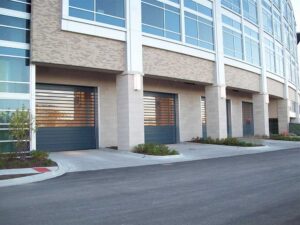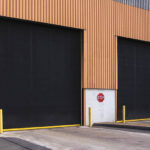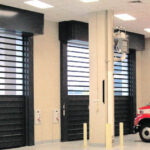
High-performance doors are essential to modern architecture, delivering the speed, safety, efficiency and security that today’s buildings demand. Rytec is committed to ensuring architects, engineers and other specifiers have the tools they need to specify the correct doors for any kind of project.
The Rytec Pro Center offers a comprehensive array of product information, documents and files. Here’s a closer look at what you’ll find on the Rytec Pro Center, your go-to resource for specifying high-performance doors for building design and remodeling projects.
Comprehensive Technical Data
The Rytec Pro Center gives you access to everything you need to specify doors, including:
- Technical data, materials, construction and clearances
- Installation requirements
- Architectural drawings and specifications
- BIM/Revit model files
With these resources, you can easily create 3D visual representations and place specific Rytec door models into your architectural project renderings. Plus, you can bundle them into one design submittal and save it for future reference.

Advanced Drawings and Design Files
We make it easy to find essential technical documents, including 2D and 3D CAD models, brochures and product sheets, on our website. You can also find other relevant Rytec product information on popular online resource platforms, such as:
Continuing Education
Rytec is an American Institute of Architects (AIA) Continuing Education Provider, offering several courses that help architects keep up with continuing education credits and maintain their certification.
We currently offer two exclusive courses:
- High-Speed High-Cycle Doors: An Introduction to High-Performance Doors for Commercial Buildings and Parking Facilities
- High-Performance Doors: Increasing Safety, Energy Savings & Productivity for Food, Beverage, & Cold Storage Facilities
These can be accessed at aecdaily.com and each provides 1LU credit per course.
In addition, we offer in-person lunch-and-learn sessions upon request. Click here to request one now.
Tailored Design Solutions
From warehouses to parking garages, high-performance doors are designed to meet the unique requirements of various industries and applications. To meet these diverse needs, Rytec designs and manufactures a wide range of door types, including:
- Fabric doors for light-duty applications
- Rigid rolling doors for enhanced security
- Sliding doors for specialized spaces
When considering which models to specify, it’s important to ensure the door’s design elements match the building’s industry classification or application type. Here’s what to consider when specifying doors:
- Aesthetic Elements. High-performance doors are designed with modern, clean lines and high-quality materials that can be customized to match many architectural styles.
- Color Options. Many Rytec doors can be designed with a wide range of RAL classic colors, or they can be custom color matched to seamlessly integrate into the branding and building designs.
- Vision and Ventilation. Select door models offer full vision and ventilation slats, while other models offer partial slats to balance aesthetics with functionality.
As extreme weather continues to affect more geographic regions, high-performance doors must be able to stand up to tough conditions – and Rytec doors are engineered to deliver. The fast opening and closing speeds keep the elements outside and the interior of the building safe and comfortable.
- High winds and hurricanes: Wind bars and locks fortify doors against wind pressure. Some models are specifically designed and rated for hurricane conditions with winds up to 175 mph and small projectile impacts.
- Cold storage: Insulated doors with thermal panels and specially designed seals maximize energy efficiency and minimize the incursion of warm air to ensure consistent temperature control.
- Hot climates: Tinted window panels on full-vision doors reduce solar heat transfer, keeping interiors cooler and more comfortable.
Accessible Expertise
Rytec sales professionals are located throughout North America, ready to answer your questions about specifying high-performance doors for nearly any application. Whether you’re selecting doors for warehouses, auto dealerships, parking facilities or food processing plants, we have the expertise and resources you need to choose the right doors for functionality and aesthetics.
Visit the Rytec Pro Center to learn more about specifying high-performance doors for your next project. Or contact us to discuss how Rytec can simplify your design challenges.




